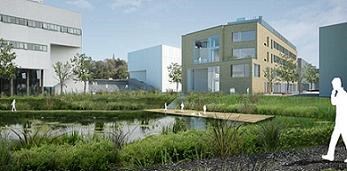This ‘real-life’ engineering challenge provided a glimpse into what life will be like for these students during the next four years of their engineering degrees – practical, industry-engaged, and based on leading edge R and D. The practical bent should come as no surprise. The goal of the School’s founders is to create ‘industry-ready’ graduates with the skills to master tomorrow’s complex engineering challenges.
The UK, in common with many of its European partners can’t get enough engineering graduates from engineering degrees. It is estimated that the Power Industry sector alone will need up to 34,000 new graduates, and ‘green engineering’ sectors, including wind power, between 50,000 and 70,000. This helps explain the rationale behind the new engineering school - namely to create the engineers of the future.
As Neil Corner, Siemens director of Service at Lincoln said: "The University’s and Siemens’ headline objective for the programme is to prepare ‘industry-ready’ graduates who can go directly into cutting edge industry."
Artist Impression of the new Engineering School at the University of Lincoln
The new Engineering School is headed by Professor Paul Stewart, who has cherry picked a first-class team of academics to develop this world class teaching and research capability. Professor Stewart and his team want to put the new school and Lincoln firmly on the map as a centre of academic and research excellence: "We want to bring together world-class R&D, in partnership with employers, and students on industry-relevant degrees that learn about the leading edge in engineering."
This year, full-time students, many sponsored by Siemens through its scholarship scheme, and part-time students, many Siemens’ employees, are starting out on the BEng Mechanical Engineering, with options to specialise in power and energy or control systems down the line. The future ambitions of the school are clearly focused on extending its offer to cater for the skills needed for the "green engineering revolution". A post-graduate MSc in Sustainable Power and Energy is also being designed for launch in the near future.
From summer 2011, the new engineering school will be housed in an exciting new building, designed by leading architects Allies & Morrison. The building will feature modern lecture theatres and seminar rooms, student teaching and project labs, research labs and combustion test cells and office accommodation for academic and research staff. There is a dedicated space for the co-location of Siemens’ training centre, including workshops, training suites and office accommodation.
The Engineering school is a new model for real partnership between industry and higher education, in the UK and beyond. The path-breaking nature of this collaboration has been recognised by the Higher Education Funding Council for England (HEFCE) and was recently highly commended at the IMechE Manufacturing Excellence Awards for Best Collaboration between Business and Education.
As Mr Corner comments: "The Siemens/University of Lincoln partnership addresses the needs of 21st century engineering - finding real world solutions by thinking differently about how a University should, and wants to, relate to industry. It offers students the opportunity to become industry-ready graduates and for staff from Siemens and the University to respond to real world needs quickly by providing wide ranging expertise not found in traditional academic environments."
.................................................ENDS.............................................................................
Notes to editors:
About Siemens in the UK
Siemens was established in the United Kingdom 167 years ago and now employs 16,915 people in the UK. Last year’s revenues were £4.2 billion. As a leading global engineering and technology services company, Siemens provides innovative solutions to help tackle the world’s major challenges, across the key sectors of energy, industry and healthcare. Siemens has offices and factories throughout the UK, with its headquarters in Frimley, Surrey. The company’s global headquarters is in Munich, Germany. For more information, visit www.siemens.co.uk
For more information and images contact:
Rachel Odams
PR Manager
Siemens plc
Tel. +44 (0)1276 690782
Mob: +44 (0)7808 824209
Rachel.odams@siemens.com
About the University of Lincoln
The University of Lincoln offers both undergraduate and postgraduate courses and has around 10,000 students. Its main campus is at Brayford Pool in the city of Lincoln. Additional campuses include: Riseholme Park - focusing on agriculture, animal-related and biological science courses; Holbeach - The award-winning National Centre for Food Manufacturing; Hull - The Derek Crothall Building accommodates the Hull Centre for Management Development and the Hull School of Health & Social Care. The University’s Brayford campus was the first new city-centre university campus to be built anywhere in the UK for 25 years and was officially opened in 1996 by HM the Queen. For more information visit www.lincoln.ac.uk
For more information, contact:
Joni Appleton
Press Office
Tel +44 (0) 1522 886244
pressoffice@lincoln.ac.uk



